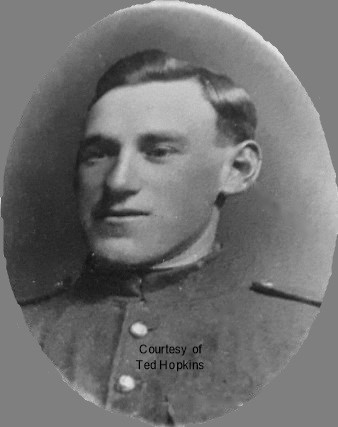|
Jan 23, 1896
|
Born in London, England to
Albert Edward and Sarah Ann Rebekah (nee Atwell) Hopkins
|
|
Jun 7, 1906
|
Embarked the SS Canada in
Liverpool with his parents

|
|
Jun 15, 1906
|
Disembarked in Montreal,
Quebec and proceeded to Port Hope, Ontario
|
|
Nov 6, 1914
|
Attested into the 21st Battalion in
Kingston, Ontario
Ø Number 59478 (temporary number 979)
Ø Next of kin given as Mrs. O.A. Hopkins, Box 329
Port Hope, Ontario
Ø Previous occupation given as Labourer
o
Later noted as File
Cutter
Ø No previous military experience given
Ø Religion given as Baptist
Ø Posted to the Machine Gun Section and employed as
Batman to Machine Gun Officer
The 21st Battalion trained in the
Kingston, Ontario area through the winter of 1914-15.
|
|
May 6, 1915
|
Embarked the RMS Metagama in
Montreal, Quebec
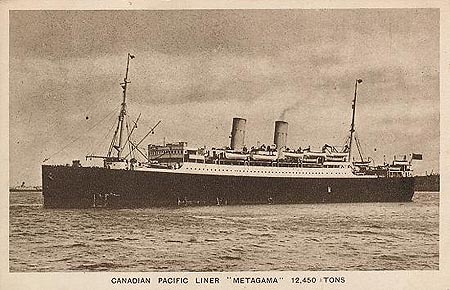
|
|
May 15, 1915
|
Disembarked in Devonport,
England and the battalion proceeded to the West Sandling Camp, near Hythe,
Kent to continue training
|
|
Jun 7, 1915
|
Admitted to the St. Martin’s
Plain Tent Hospital with a diagnosis that reads Gonorrhea
|
|
Jun 25, 1915
|
Discharged from hospital
|
|
Jun 26, 1915
|
Posted to “D” Company from the
Machine Gun Section
|
|
Aug 31, 1915
|
Forfeited 2 day’s pay for
being absent
|
|
Sep 14, 1915
|
Embarked the St. Seiriol in
Folkestone
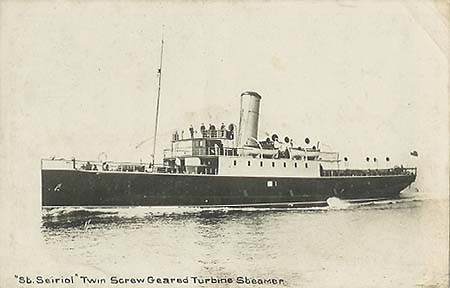
|
|
Sep 15, 1915
|
Disembarked in Boulogne,
France and the battalion proceeded to St. Omer
|
|
Dec 7, 1915
|
Private Hopkin’s father urged
him to transfer to the Artillery to be with his friends from Port Hope. Albert Hopkins made that request and was
transferred to the 4th Battery, 1st Brigade, CFA
(Canadian Field Artillery) with the rank of Gunner
|
|
Nov 1, 1916
|
While in positions near
Pozieres, France, the artillery was firing on the area of Regina Trench when
Gunner Hopkins received shrapnel wounds to his legs and was evacuated from
the position for treatment
|
|
Nov 4, 1916
|
Transferred to the No. 5
General Hospital in Rouen, France with shrapnel wounds to his legs
|
|
Nov 6, 1916
|
Invalided to England aboard
the Hospital Ship Panama
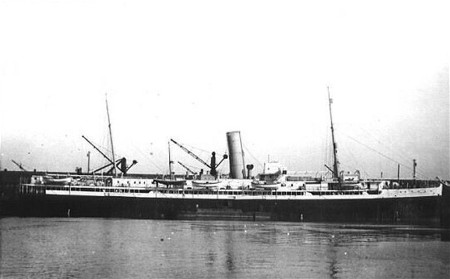
On arrival in England he was
admitted to the 2nd Western General Hospital in Manchester
Transferred to the CCAC
(Canadian Casualty Assembly Centre) for pay purposes while in hospital
|
|
Jan 1, 1917
|
Transferred to the Canadian
Convalescent Hospital in Epsom
|
|
Jan 18, 1917
|
Discharged from hospital and
attached to the CCD (Canadian Command Depot) for Physical Training
|
|
Feb 4, 1917
|
Admitted to the Canadian
Military Hospital in Hastings with an infected right heel
|
|
Mar 10, 1917
|
Transferred to the Canadian
Artillery Reserve Depot and attached to the 3rd Canadian Command
Depot for Physical Training
|
|
Apr 26, 1917
|
Attached to the 1st
Canadian Command Depot and admitted to the St. Leonard’s Hospital for
Physical Training
|
|
May 8, 1917
|
Discharged from St. Leonard’s
Hospital and reported to the Canadian Casualty Assembly Centre
|
|
Jul 10, 1917
|
Transferred to the 1st
Brigade, Artillery Depot in Shorncliffe
|
|
Jul 14, 1917
|
Admitted to the Moore Barracks
Military Hospital with a diagnosis that reads suspected VDG (Venereal Disease
Gonorrhea). Later noted as
Non-Venereal
|
|
Jul 17, 1917
|
Discharged from hospital
|
|
Aug 20, 1917
|
Transferred to the 1st
DAC (Division Ammunition Column) and proceeded to France
|
|
Aug 21, 1917
|
Arrived at the Canadian
General Base Depot in Etaples, France and TOS (Taken On Strength) the 1st
Division Ammunition Column
|
|
Aug 22, 1917
|
Gunner Hopkins was admitted to
the No. 7 General Hospital in Etaples with a diagnosis that reads Ingrown
Toenail prior to joining his unit
|
|
Sep 4, 1917
|
Discharged from hospital to
the Base Details in Etaples
|
|
Sep 12, 1917
|
Transferred to the 1st
Artillery Brigade
After leaving the base depot,
Gunner Hopkins joined the 1st Brigade, 4th Battery,
Canadian Field Artillery
|
|
Nov 5, 1917
|
While the 4th
Battery was firing on the Passchendaele front from a position near
Gravenstafel, Belgium, Gunner Hopkins received shrapnel wounds to his chest
and left ankle. He was evacuated to
the 2/1st Home Counties Field Ambulance for first aid before being
transferred to the No. 61 CCS (Casualty Clearing Station)
|
|
Nov 6, 1917
|
Transferred via the No. 17 AT
(Ambulance Train) and admitted to the No. 3 Australian General Hospital in
Abbeville, France
|
|
Nov 10, 1917
|
Due to the severity of the
wound, the left leg was amputated 8½ inches below the knee
|
|
Nov 18, 1917
|
Invalided to England and
admitted to the 2nd Western General Hospital in Manchester
Transferred to the CARD
(Canadian Artillery Reserve Depot) for pay purposes while in hospital
Awarded the Good Conduct Badge
|
|
Dec 9, 1917
|
Transferred to the Jericho
Military Hospital, Bury, Manchester
|
|
Feb 26, 1918
|
Transferred to the Military
Convalescent Hospital in Woodcote Park
|
|
Mar 19, 1918
|
Transferred to the Granville
Canadian Special Hospital in Buxton
|
|
Mar 21, 1918
|
Granted permission to marry
|
|
Apr 12, 1918
|
Granted leave until April 21
|
|
Apr 14, 1918
|
Albert Hopkins was married to
Florence Ruby Herrmann in West Ham, London
|
|
Apr 21, 1918
|
He did not return from leave
and was declared to be AWL (Absent Without Leave)
|
|
May 3, 1918
|
Returned to the hospital from
being absent and forfeited a total of 36 day’s pay for his absence
|
|
May 27, 1918
|
Transferred to the No. 5
Canadian General Hospital in Liverpool
|
|
Jun 6, 1918
|
Invalided to Canada aboard the
Hospital Ship Llandovery Castle, embarking in Liverpool
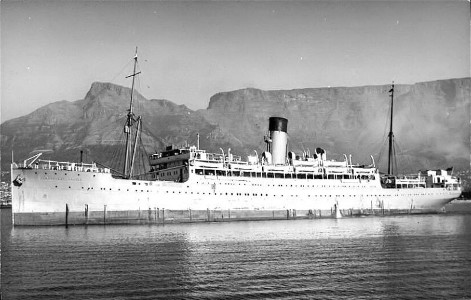
|
|
Jun 17, 1918
|
Disembarked in Halifax, Nova
Scotia and proceeded to Toronto, Ontario where he was admitted to the
Davisville Military Hospital
Note that the Llandovery
Castle was sunk by a German torpedo 10 days later on the return voyage to
England
|
|
Jun 20, 1918
|
Granted leave until July 4 and
given instructions to report to the Whitby, Ontario Military Hospital on
completion of his leave
|
|
Jul 4, 1918
|
Admitted to the Whitby
Military Hospital and noted as using a peg on his amputated leg
|
|
Jul 22, 1918
|
Transferred to the Military
Orthopedic Hospital in Toronto and measured for an artificial leg
|
|
Aug 16, 1918
|
Received his artificial leg
and it is noted as being satisfactory
|
|
Aug 17, 1918
|
Posted to the Casualty Company
in Toronto
|
|
Aug 30, 1918
|
Albert Robert Edward Hopkins
was discharged from the CEF in Toronto, Ontario
Ø Rank on discharge
Gunner
Ø Entitled to War
Service Badge Class “A”
Ø Entitled to 2 Gold
Wound Stripes
Ø Proposed residence
on discharge 41 Amelia St., Toronto, Ontario
Following the end of the war,
the 1914-15 Star, British War Medal and Victory Medals were sent to him at 41
Amelia St., Toronto, Ontario
|
|
Jun 11, 1928
|
Albert Robert Edward Hopkins
died of heart failure while a patient of the Christie St. Hospital in Toronto
and was buried in the Prospect Cemetery there.
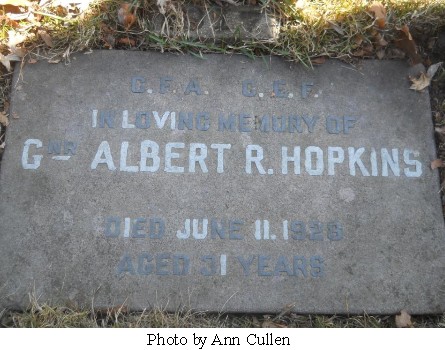

His death was due to his
military service and the Plaque (Dead Man’s Penny), Scroll and Memorial Cross
were sent to his widow, Mrs. Florence Hopkins, 27 Lutterell Ave., Toronto,
Ontario
A second Memorial Cross was
sent to his mother, Mrs. A.E. Hopkins, Box 329 Port Hope, Ontario
|
|
